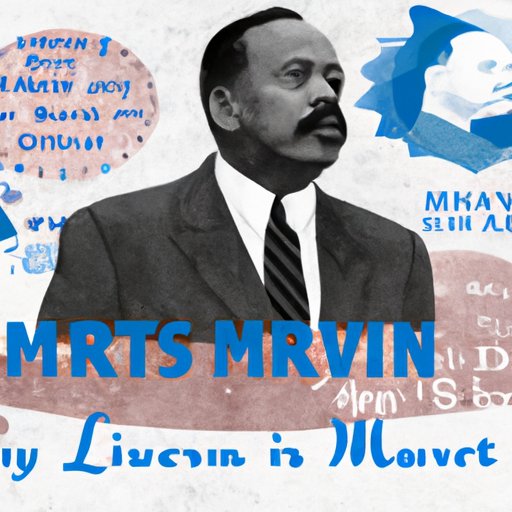Introduction
Leadership is the ability to influence and motivate others towards a common goal. Martin Luther King Jr. is one of the most iconic leaders in history. His commitment to nonviolent protest and civil disobedience has inspired generations of people to fight for justice and equality.
In this article, we’ll explore what made Martin Luther King Jr. a good leader. We’ll look at his leadership style, his legacy of nonviolent protest, his impactful speeches, his vision for a just society, and his contributions to civil rights movements.
Analyzing MLK’s Leadership Style
Martin Luther King Jr. was a strong believer in nonviolence. He was a firm advocate of using peaceful methods to achieve social change. He believed that violence only begets more violence, and that peace could be achieved through civil disobedience and peaceful protests.
King had a charismatic personality that enabled him to connect with people on an emotional level. His presence was inspiring and uplifting, and he was able to rally people around a cause. He was a powerful orator, and his speeches were often filled with optimism and hope.
Another key element of his leadership style was his ability to motivate and inspire others. He was able to bring out the best in people, and to encourage them to take action. His passion and enthusiasm for the civil rights movement was contagious, and it helped to galvanize a generation of activists.
Examining His Legacy of Nonviolent Protest
Throughout his career, King used nonviolent protest to draw attention to the injustices faced by African Americans. One of his most famous campaigns was the Montgomery Bus Boycott in 1955. This protest lasted for over a year and resulted in the desegregation of public transportation in the city.
In 1963, King organized the March on Washington for Jobs and Freedom. This massive demonstration drew more than 200,000 people to the nation’s capital. The march was a seminal moment in the civil rights movement, and it helped to pass the Civil Rights Act of 1964.
The Birmingham Campaign was another important protest led by King. This campaign was focused on bringing attention to the injustices faced by African Americans in the city of Birmingham, Alabama. The campaign was marked by peaceful protests and civil disobedience, and it resulted in the desegregation of public facilities in the city.

Exploring the Impact of His Speeches
Martin Luther King Jr. was a masterful speaker, and his speeches had a profound impact on the civil rights movement. His “I Have a Dream” speech is perhaps his most famous address. Delivered in August 1963, the speech was a call for equality and justice for all Americans, regardless of race.
His “Letter from Birmingham Jail” was another powerful speech. Written in April 1963, this letter addressed the criticisms of the civil rights movement and explained why nonviolent protest was necessary for progress. The letter was widely read, and it helped to galvanize support for the movement.
In 1964, King delivered his Nobel Prize acceptance speech. In this address, he spoke about the importance of peace and reconciliation, and he called for an end to racial discrimination. The speech was seen as an important moment in the struggle for civil rights, and it helped to elevate King to an international figure.

Uncovering His Vision for a Just Society
Martin Luther King Jr. had a clear vision for a just society. He believed that everyone should be treated equally regardless of race, gender, or religion. He emphasized the importance of justice and peace, and he called for an end to discrimination and segregation.
He also believed in the power of love and understanding. He advocated for reconciliation between different races, and he urged people to come together in pursuit of a better world. He was a passionate believer in the power of human relationships, and he saw these relationships as essential for creating a just society.

Investigating His Contributions to Civil Rights Movements
Martin Luther King Jr.’s leadership of the civil rights movement had far-reaching effects. His efforts helped to pass the Voting Rights Act of 1965, which gave African Americans the right to vote. He also supported labor unions and other organizations that championed workers’ rights.
In 1957, King founded the Southern Christian Leadership Conference (SCLC). This organization was dedicated to advancing civil rights through nonviolent protest and civil disobedience. Under King’s leadership, the SCLC organized numerous protests and demonstrations, and it helped to pass numerous civil rights laws.
Conclusion
Martin Luther King Jr. was a visionary leader who changed the course of history. His commitment to nonviolence, his inspirational speeches, and his vision for a just society helped to shape the civil rights movement. His legacy continues to live on today, and his example of courage and determination will continue to inspire future generations.
(Note: Is this article not meeting your expectations? Do you have knowledge or insights to share? Unlock new opportunities and expand your reach by joining our authors team. Click Registration to join us and share your expertise with our readers.)
